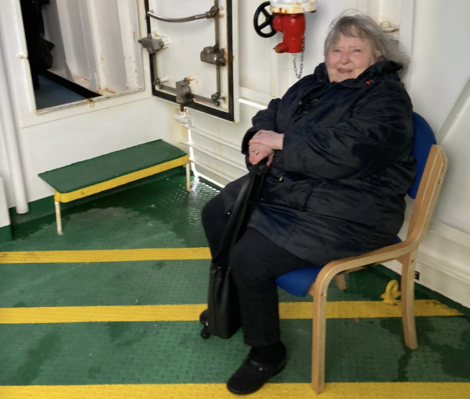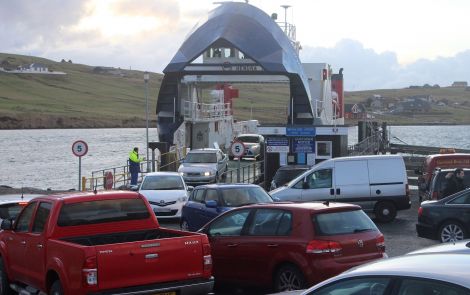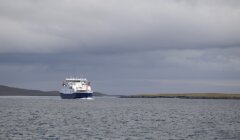Transport / Accessibility issue leaves 79-year-old sitting ‘freezing’ on ferry deck
The incident has prompted renewed calls for a replacement for Whalsay’s Hendra ferry ‘sooner rather than later’
A SEVENTY nine year old woman with mobility issues says she was left “absolutely numb with cold” after having to sit on a chair on the deck of a Whalsay ferry due to poor on board accessibility – all whilst heading to a friend’s funeral.
Flossie Horne was unable to get into the ferry’s passenger accommodation due to the height of a step, and vehicles on board were too high for her to sit in.
The foot passenger said the crew were a big help and gave her a seat to use on the side of the deck for what is a 30 minute journey.
But Horne said it was a “disgrace that people with disabilities have to travel like this nowadays”.
The council ferry in question is the Hendra, which is now more than 40 years old and is slated for future replacement.
Horne said the vessel is not fit for purpose and added to calls for the ferry to be replaced.
Chair of Shetland Islands Council’s environment and transport committee Moraig Lyall said she has asked ferry staff if any mitigations are possible to “ensure a comfier and warmer experience” should the situation happen again.
She also agreed that it adds “weight to the need to get new vessels sooner rather than later”.
Although talks are ongoing with the Scottish Government, Shetland Islands Council does not yet have funding in place for any ferry replacements, so there is no indication as to when a new vessel could be in service.
Whalsay is also one of Shetland’s islands pinpointed for a possible tunnel, but this would be many years away – if one ever came to fruition.
Become a member of Shetland News
Horne, who lives in Lerwick, took the ferry earlier this month to attend a funeral in Whalsay.
With a bad knee and needing to walk with a stick, she said she was unable to get over the “very high” step to sit inside in the ferry and get away from the elements.
Despite the help of the “absolutely lovely” crew, the end result was Horne having to sit “freezing” at the side of the deck on a chair.
“When we got to Whalsay I was dat cold I could hardly walk,” she said.
Horne added that she actually delayed her planned return trip back to the Shetland mainland to avoid getting the Hendra again.
Her sister vessel Linga which also runs on the route is newer and has a lift installed.
Horne said she spoke to staff in the council’s ferry operations department afterwards and suggested installing some form of ramp to allow better access.
“Why can you no have a peerie bit of a ramp that you could walk up, and somebody could hold onto you until you got to the top?” she said.
Councillor Lyall said as a formal complaint was being investigated, she could only respond generally to the matter.
“We know some of our vessels are old and don’t meet modern expectations in terms of access but these are not things that are easily adapted,” she said.
“It just helps add weight to the need to get new vessels sooner rather than later.
“Disabled people rarely travel as foot passengers so this doesn’t occur very often.
“I have asked our ferry staff if any mitigations are possible to ensure a comfier and warmer experience should it happen again.
“I understand the Linga does not have the same design so is more easily negotiated by disabled passengers.”
Last year a consultation was held by local transport partnership ZetTrans on the future transport links for Whalsay.
At that time the preferred option from the council’s point of view was a phased approach where progress is made on a new 38m replacement vessel for the Hendra in the immediate term, while improved travel choice options would also be explored.
North Isles councillor Duncan Anderson, who is from Whalsay, said given the age of the ferry he was not surprised to hear someone has had problems.
“I have spoken to the head of service and am assured the complaint is being handled appropriately and that they are looking into options which may make these situations easier in the future,” Anderson said, “but making such modifications are not straightforward on these old vessels”.
He added: “I was encouraged but not surprised to hear praise for the ferry staff in assisting the passenger on her journey.
“However the underlying problem here is that ferries like the Hendra are long past the age where they should have been replaced.
“A situation the council is unable to rectify without central government help. This is just one example of why this is such a priority.”
Last month councillors agreed to commit around £700,000 to developing business cases on Shetland’s wider internal transport network, taking into account both ferry replacements and tunnels.
Accessibility on the council’s ferries vary depending on the vessels’ age; some have disabled toilets, for instance, but some do not.
One of the least accessible ferries is the Good Shepherd IV on the Fair Isle route, which is nearly 40 years old.
However, the council secured funding to the tune of around £27 million earlier this year for a replacement Fair Isle ferry and harbour works.
The Hendra has the longest service of all council ferries, having begun in 1982.
Papa Stour’s Snolda followed in 1983, while the relief boat Fivla entered service in 1985.
With the ferry fleet continuing to age, which is affecting reliability and the cost of maintenance, the idea of fixed links such as tunnels on the busiest routes has significant support within the council chamber.
However there is an acknowledgement that ferry replacements still need to be pursued due to the timeframe around fixed links.
Become a member of Shetland News
Shetland News is asking its many readers to consider paying for membership to get additional features and services: -
- Remove non-local ads;
- Bookmark posts to read later;
- Exclusive curated weekly newsletter;
- Hide membership messages;
- Comments open for discussion.
If you appreciate what we do and feel strongly about impartial local journalism, then please become a member of Shetland News by either making a single payment, or setting up a monthly, quarterly or yearly subscription.
















































































